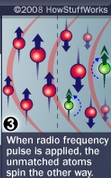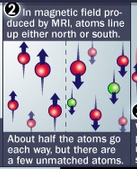Everything posted by fredreload
-
I want to create a 1 meter BEC
Hmm, first of all, thanks for the explanation. I thought I can have the rubidium gas atoms flying around so it can be cooled by radio wave, but it seems a magnetic field line is needed to line up the molecules so they go into precession(rotation). This is in contrast to the laser cooling in which the molecules are "confined" in a region, to me it seems like the laser needs enough strength so that it produces a 500MHz frequency at the "center" of the magneto-trap. But since I have the molecules lined up with a magnetic field, all I need to worry about is the rotational frequency. As you can see below in the article that the water molecule rotational transition is at the microwave region 200 cm−1. But I do not know the rotational transition frequency for rubidium = =. https://en.wikipedia.org/wiki/Electromagnetic_absorption_by_water Of course I cannot think of a way to line up the rubidium gas atoms with the magnetic field line = =. So I will work on that(if someone knows feel free to let me know). P.S. Many thanks for Dr. Swansnot's on the explanation on laser cooling. If I made a mistake I will go back and look into them
-
I want to create a 1 meter BEC
Right, it might take longer to cool down, but since there is nothing to heat up the rubidium(in a dark vacuum), it should gradually reach a minimum threshold, well in theory. I am curious about the laser frequency they use in the experiment to cool rubidium. Shouldn't it be somewhere in the radio frequency as well? Or does the laser encompass from infrared to radio wave = =? https://en.wikipedia.org/wiki/Saturated_absorption_spectroscopy Since the absorption spectrum for rubidium states 500MHz, which is the radio wave wavelength.
-
I want to create a 1 meter BEC
Well first of all, respect for your 30 years working on laser cooling @@ Well I was not referring to the magnetic field for MRI, I was referring to the radio wave emitted from the antenna. So if I imagine I have like 6 antenna in 6 directions(if not 8), beaming at rubidium molecules in a vacuum emitting radio frequency pulse slightly below the rubidium absorption spectrum, would that suffice for laser cooling? Thanks for taking the time to answer my question And ya, I am working out the absorption frequency https://en.wikipedia.org/wiki/Saturated_absorption_spectroscopy
-
I want to create a 1 meter BEC
R goes for resonance. Yes confined means keeping a lion in a cage. I am thinking of keeping the water molecules "line up" with magnetic field then reduce the rotational transitions with microwave thereby cooling its temperature. Radio wave also has momentum so you do not need a laser to do this. Now when it comes to water suspension in mid air, well still thinking about that, I am not sure if I need a capacitor(electric field) for water molecules suspension in mid air(I can use some help on this). Then there is the choice of rubidium(light goes dimmer), or stopping the photon molecules in BEC, two different types of photons storage. But if I switch to rubidium right now I have to worry about another wavelength of electromagnetic absorption for cooling it without using a laser. Anyway the idea is. 1. Use radio wave/microwave for cool down because it covers more surface area than the laser. But radio wave/microwave has limited spectrum. 2. Use a magnetic field to line up the water molecules and slow down their rotational transitions(I dunno about vibrational transitions, depends on how low the temperature goes). P.S. You asked me how to get it to one meter so I am showing my ideas
-
I want to create a 1 meter BEC
-
I want to create a 1 meter BEC
Well, for MRI the water molecule is confined by the magnetic field because it is polarized. I will post how MRI works here(https://science.howstuffworks.com/mri.htm). And my emphasis is on the part precisely about the magnetic moment. Now what matters about laser cooling is the absorption wavelength. Please refer to this video(I know you hate videos = = ) Now since I have water molecules confined at a location with magnetic field, and I know it absorbs radio wave shown in how stuff works. I can just tune the radio wave to slightly above the absorption wavelength of a still water molecule. And since I do not know how wave works I will place the radio wave on all 6 directions relative to the water molecules. It probably takes a few hour to cool but water molecules do absorb radio wave.
-
I want to create a 1 meter BEC
Hmm, I need to review the concept of laser cooling. To me it sounds a bit like MRI. If I want to confine atoms at a place I use a magnetic field, then I apply radio wave to make the precession goes faster, I wonder if I can get it to move slower. The problem is the molecules need to be magnetically charged, like H2O
-
I want to create a 1 meter BEC
In case you are wondering about the design I went with the NASA design on the previous page. The gas is placed in a vacuum and since it moves around it should be uniformly cooled down to a certain temperature. https://scitechdaily.com/one-giant-leap-for-quantum-science-exotic-fifth-state-of-matter-created-on-space-station/?fbclid=IwAR3yVW6EWysHTSnZpzbTFOtwBTqkVtRJj6eWYDbQZozWHG_RKnfHiMcHeDs
-
I want to create a 1 meter BEC
Thanks sir
-
I want to create a 1 meter BEC
As I stated I might have not been meticulous enough about my title and result in confusion. But after re-stating my problem I got my answer and I thank Dr. Swansnot for that. It is not because I do not have 50 grand to test Einstein's special relativity so I cannot theorize about it here. Given sure, this is a more of a pop-sci question, I did not know you guys do not like pop-sci = =. Let me know if I can post more pop-sci questions in the future or if I should keep them to myself.
-
I want to create a 1 meter BEC
I got a question, how would you compare this to shining a light against a cement wall? Are the photons also absorbed by the wall or destroyed. Clearly the cement wall does not re-emit photons afterward P.S. O nvm, Google was acting up @@, thanks for the explanation P.S. Sigh, some of the shows are over rated P.S. That is one awesome explanation
-
I want to create a 1 meter BEC
Clearly swansnot has the BEC design in mind or he has an in depth knowledge about it that is why he is so critical about me scaling up the design P.S. And no I am just theorizing it I am not building a BEC @@, sorry for the confusion
-
I want to create a 1 meter BEC
I think swansnot really does intend to help me build the design = =, so my fault for not stating it properly
-
I want to create a 1 meter BEC
Sure if I can conduct an interview with her and go to Harvard = =. My question is more like can BEC confine light with its original energy(aka no energy loss), yes or no? Clearly I wouldn't put all that in the title = =. But anyway I get your idea, going from the ground up, and I respect that. It just, few really has the opportunity to do so, and if you follow an article on procedural work = =, might as well watch an in depth video.
-
I want to create a 1 meter BEC
Nvm if you are confused sorry about that = =, stand point means you guys consider the topic top secret and do not want to discuss further about it. P.S. And I am late by 20 years Those are expressions like sad face =/, and confusion face @@, I try to make emoji to appear more user friendly
-
I want to create a 1 meter BEC
True, I am theorizing the idea in case someone(with 50 grand) came across and find this theory useful(if he already does not have a BEC), build a BEC and use it to promote me = =, kind of a long shot, I know. I dunno you guys stand point, could be top secret, just happened to fire an ion cannon on my building(test shot?) while I was there @@ to stop time, and use it on numerous movies, anime, and novels.
-
I want to create a 1 meter BEC
Nvm I will shut it, this is your forum
-
I want to create a 1 meter BEC
If you are so knowledgable about BEC why don't you share your science? You think a video from Harvard Institute is sci-fi?
-
I want to create a 1 meter BEC
Alright = =, let me add one more thing to prove that the light can be stopped inside a BEC and I will work on the design = =, if you got any lead I will be happy to hear it = =. Essentially increasing the mass of light is not energy loss. As for the design concept, perhaps something like this NASA setup. https://scitechdaily.com/one-giant-leap-for-quantum-science-exotic-fifth-state-of-matter-created-on-space-station/?fbclid=IwAR3yVW6EWysHTSnZpzbTFOtwBTqkVtRJj6eWYDbQZozWHG_RKnfHiMcHeDs
-
I want to create a 1 meter BEC
https://www.physicscentral.com/explore/action/light.cfm This article is interesting in that the light slows down because it is turned into polaritons, something with higher mass. This means the light's energy is unchanged and stored(speculation). And this is the actual experiment https://www.nytimes.com/2001/01/18/us/scientists-bring-light-to-full-stop-hold-it-then-send-it-on-its-way.html
-
I want to create a 1 meter BEC
Why is light not affected by magnetic fields? But the reason that light and magnetism do not recognize one another is that light has a so much higher frequency – it oscillates 10,000 times faster than the fastest magnetic fields. “Photons, that is, particles of light, can be absorbed. https://kaw.wallenberg.org/en/research/coupling-light-magnetism-nanoscale I think when you slow light down by a factor of 3 million times the magnetic field should have an effect on the light wave. It is just whether this photons exist as a necklace or beads
-
I want to create a 1 meter BEC
Ya, I know, I probably wouldn't be able to build one but just theorizing and verifying the concept https://physicsworld.com/a/slowed-light-breaks-record/ This settles it, trapping atoms with a magnetic field might be able to be applied to photons as well since it exist as an em wave(speculation) https://scitechdaily.com/one-giant-leap-for-quantum-science-exotic-fifth-state-of-matter-created-on-space-station/
-
I want to create a 1 meter BEC
To me, the hard part is not on scaling the medium but on trapping and directing the photons, clearly you can’t just place mirrors everywhere to direct the flow of photons
-
I want to create a 1 meter BEC
O, I am not sure = =. I am thinking of some theoretical photon generators such as light antenna or ion cannon but those are theoretical applications. Perhaps a point laser that is possible of photons expansion. I am not sure about the medium they talked about in BEC, increasing the size of this medium would be good
-
I want to create a 1 meter BEC
Check the video I posted, all the same scale but larger(I am not sure how they created this BEC medium, I will have to review the article), and I will try to confine the light at the center through a mirror or gravity confinement. I am not sure yet how to trap a light source. Perhaps you could provide some ideas for me


